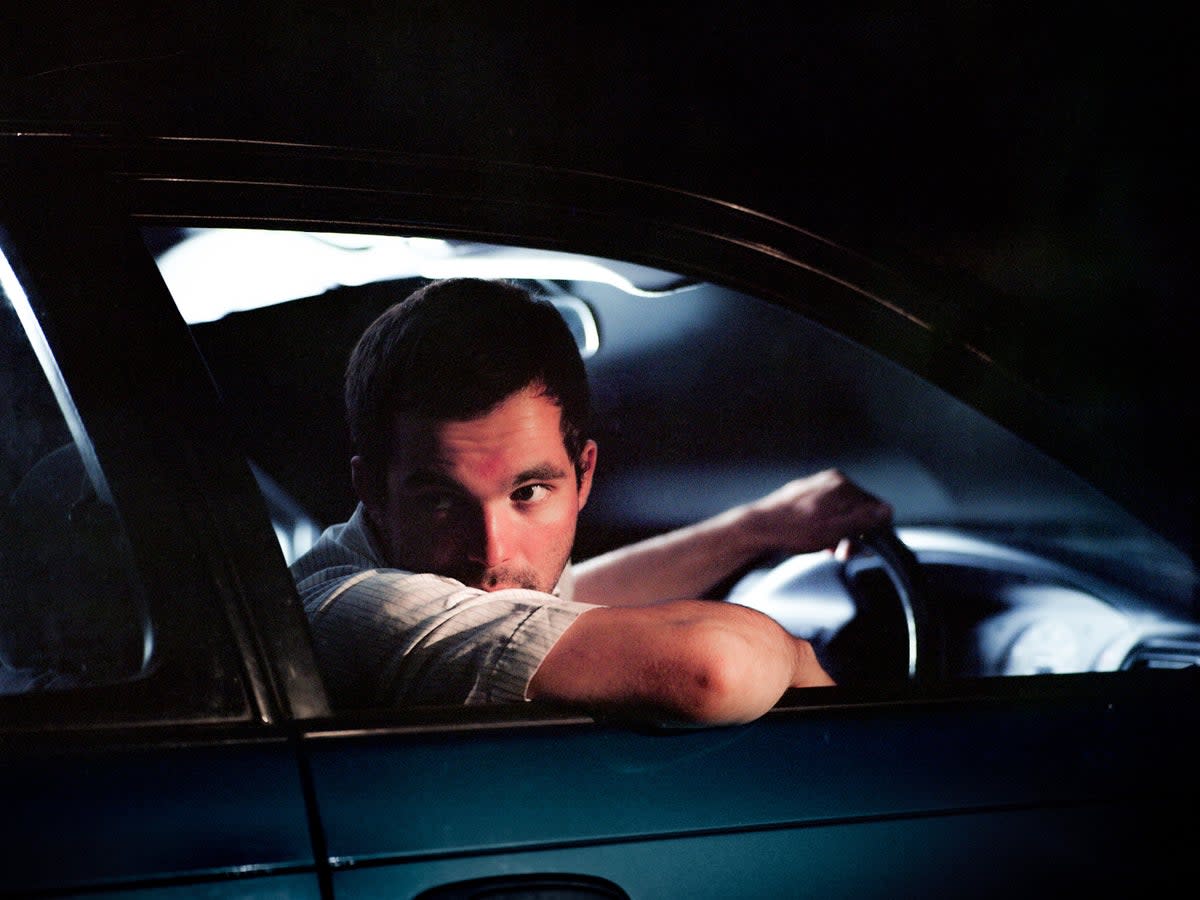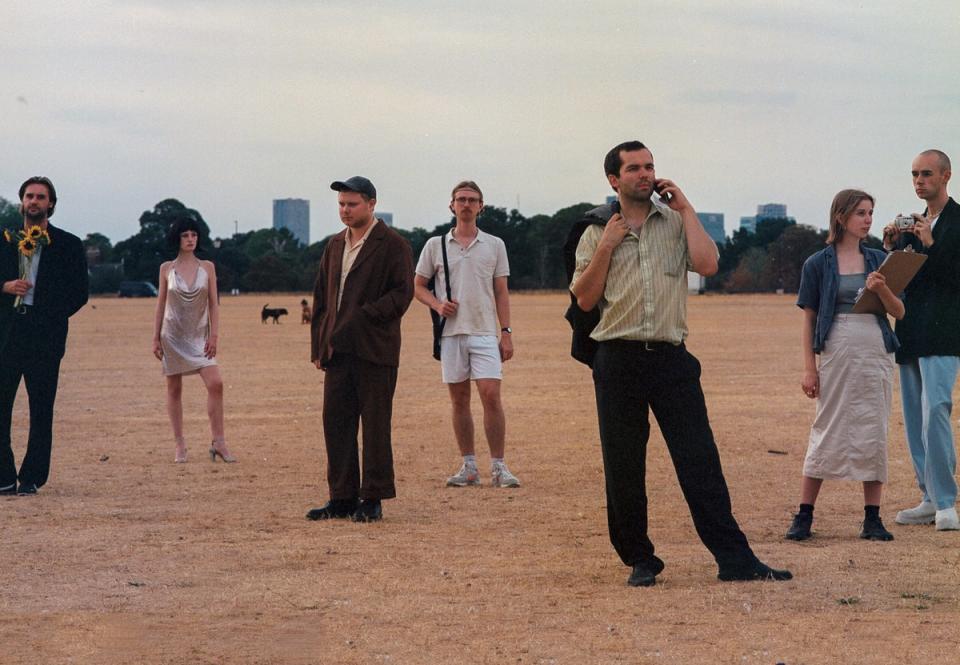The Golden Dregs’ Benjamin Woods: ‘The government needs to intervene and regulate what people can do with second homes’

Benjamin Woods, the bear-like, baritone-voiced frontman of indie band The Golden Dregs, lets out a big sigh. “Ahhh,” he says, before taking a big gulp of Guinness. “We’re going to have to talk about lockdown, I guess.” While we are thankfully now at a point where pandemic chat isn’t creeping into every single conversation, it’s impossible to properly talk about his new album, On Grace & Dignity, without going there.
Written by Woods in the depths of the pandemic, the record is a warm, dreamy paean to the grit and gorgeousness of Cornwall’s capital, Truro. It’s the seven-piece’s third album, and their first since signing with British label 4AD, home to bands such as Pixies, Big Thief and The National. Woods, whose gruff tones and wry, observational lyrics have earned him the moniker of the “Cornish Leonard Cohen”, started work on it from his south London home (when he was furloughed from his bar job at the Tate Modern) and then finished it off in his childhood bedroom in Truro (after the furlough scheme ran out and he lost said job).
“I moved back in with my parents and got work as a labourer on a building site in the bleak winter,” says Woods, sitting outside a community-owned pub in Nunhead, near where he lives in London. The 31-year-old is wearing a black wool hat and a brown suede coat, rubbing his hands together to stave off the February chill. “It was while working on the site, spending time walking around the town I grew up in and visiting old memories, that I started to build this idea of what an album could be.”
Gentrification, in particular in Cornwall, is one of the album’s biggest themes. On “How It Starts”, Woods sings, “Rows and rows of houses/ Brick and mortar graves/ Nothing ever happens/ They ostracised the brave/ But that doesn’t matter/ There’s nothing left to save.” These words were on Woods’ mind when he was doing landscaping on the building site for affordable housing – a response to so many existing Cornwall properties becoming Airbnbs or second homes. “‘Landscaping’ makes it sound more fancy than it was,” says Woods, with a chuckle. “It was actually just shovelling mud onto big piles of rock to make gardens.” Woods says they struggled to recruit locally and some of the builders who came from elsewhere did drugs at work. “Driving diggers on coke. I was working with my mate and we had a nice time together, but the actual experience of it was like, what the hell is this?”
Woods doesn’t go into too much detail about the building site, saying he doesn’t want to “end up with a horse’s head in my bed”, but he laments the way that local government seem to stick a temporary plaster on the issue of gentrification, by building new houses that won’t last, rather than instating stricter rules. “They need to intervene and regulate what people can do with second homes,” he says.
He calls Bait, Mark Jenkin’s arresting 2019 film about Cornish locals at war with tourists, “just perfect”. Woods actually asked Jenkin to make a music video for The Golden Dregs, but says the filmmaker left his message “on read”. “The thing that irked me most is he did a music video for The Smile,” says Woods, only playfully peeved. “Amazing. Love their record. But Thom Yorke’s a f***ing second homeowner in Cornwall!” It’s unclear whether Yorke’s Cornwall digs do qualify as a second home, or whether he lives there most of the time, but it still suggests an influx of the super-rich to the region.
The lead single on the album, the thrumming, meditative “American Airlines”, was written in the London phase of Woods’ lockdown. “I was getting up really early in the morning to try to write,” he says, “and I just sat in the window, and it was a perfect blue sky, and there hadn’t been many planes. Then one went by, and I put myself on it and imagined other people travelling. There was a lot going on in the world at the time, and for some people, their main complaint was that they couldn’t go on holiday.” He laughs incredulously. “I don’t think that was unjustified, but at the same time, I was like, really? I think it’s a very British thing to live for your holiday. I don’t want to offend anyone, but I just think that’s a shame.”
Woods says that the album’s fourth track, “Before We Fell from Grace” – on which his deep, gravelly voice is lifted by his sister Hannah’s mournful saxophone – is his favourite thing he’s ever written. Hannah, who works in the art world but drifts in and out of the group, was the one who introduced her brother to most of their bandmates.
His stately, thoughtful songs may have become earworms that 6 Music DJs from Marc Riley to Tom Ravenscroft keep returning to, but Woods didn’t grow up in a particularly musical family – he and his sister are the only instrumentalists. He always knew, though, that he wanted to work in the industry. He started out as a drummer, playing in several bands in Falmouth and while at university in Manchester. He then moved to London, aged 25, with the intention of getting work at a record label, but despite applying for about 40 industry roles, didn’t have any luck. So instead, he got a job in a factory making Christmas decorations. “Lots of musicians do it – I think The Magic Numbers used to,” he says, with a smile. “We’re like actual elves. And they play Christmas music.”

A stint as a session drummer on tours for other bands followed, and then Woods released his first Golden Dregs album Lafayette, in 2018, followed by heartbreak album Hope is for the Hopeless in 2019. He loves the industry, and everyone he’s met and worked with within it, but he struggles with how social media has impacted the way that fans consume music. “My sister went to see Mitski and she said it was completely ruined by TikTok kids,” he says. “They were completely indifferent until the song they know a bit of came on, and then all the phones came out. I hate that.”
Woods has mixed thoughts about streaming. “I think it’s amazing that it completely democratises music,” he says. “Some random Pavement B-side is now one of their biggest songs. I think that’s really cool. And from a financial perspective, you can earn in perpetuity off something you release now. But I love albums, and the streaming infrastructure doesn’t work for that now. It’s all playlists. And I’ve put so much time into this album that I want it to be listened to from start to finish.”
He smiles, thinking back to a teenage memory in Truro. “The first time I heard the Pixies was when I bought Surfer Rosa in a shop for three quid, and I put it on and was like, these drums sound horrible.” He sinks the dregs of his Guinness. “But because I’d paid for it, I was like, I’m gonna listen to it a few more times, and then you start to really care about it.”
‘On Grace & Dignity’ is out now on 4AD

